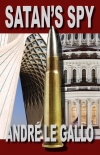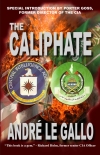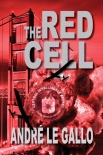Satan's Spy (The Steve Church saga Book 2) by André Gallo (dark academia books to read .TXT) 📗

- Author: André Gallo
Book online «Satan's Spy (The Steve Church saga Book 2) by André Gallo (dark academia books to read .TXT) 📗». Author André Gallo
Neither had the CIA been able to produce the officer who would meet with him. It would have made more sense for the two of them to sit down and plan their operation in McLean than later in Tehran. The CIA was still looking for the “right” case officer when he headed back to Iran. Yazdi had asked Marshall to be that person and Marshall was willing.
For whatever reason, however, the CIA leadership didn’t choose Marshall. Not able to introduce him to the intelligence officer who would meet with him in Tehran had created uncertainty and tension in his mind. Was the CIA up to this? His life would be on the line. He trusted Marshall, but others seemed somehow too eager to get him on the plane and, as they phrased it, “In place.”
He had hesitated and reflected on the consequences of his actions before eventually making the call to the number in Basra, Iraq that the CIA had given him. His call had been the signal that he was back, not under suspicion or control, and therefore prepared to meet the following Wednesday evening at eight thirty, or any Wednesday evening for a month, until contacted.
* **
Since the Iranian energy sector was largely a government monopoly, Steve spent all of his days making calls on officials of the ministries of energy, of foreign trade and of commerce. He quickly formed a metric of the official’s role in the food chain by the length of the official’s stubble; the longer it was the more important its owner. A trim three-day stubble, kept at bay with an electric razor, conveyed an attempt at compromise between the modern and the traditional religious look. The mullahs with the greatest claim on wisdom had the longest beards, some dyed with henna. Those who wished to be perceived as moderates kept their beards from dominating their appearance. Non-clerics who wished to adopt the pious look had trimmed round beards.
Invariably, his Iranian interlocutors were confused and resistant to the idea of temperature-control technology, but Steve thought he was starting to get through. Maybe he had been talking to the wrong people. He was now trying to arrange a visit to an actual facility where he could explain his product to hands-on managers with challenging budget constraints.
He had been conscious of surveillance and didn’t think he had aroused any undue suspicions.
At five p.m. Wednesday, he stepped out of his hotel into the all-engulfing roar of rush hour traffic. The main avenues were de facto one way in the direction of the heaviest traffic flow at the time. Streets designed with one lane in each direction were now four lanes in one direction. Sidewalks provided additional opportunities to move ahead requiring pedestrians, lower forms of life in rush hour, to be nimble if not equipped with sufficient sense to fit into a higher, motorized, species. Horns and flashing lights were essential and in constant use.
Steve negotiated a price and got in a hotel cab. The driver plunged into the battle and within minutes was stuck in the middle of an intersection with car hoods pointing in all the directions of the compass. In English the driver asked, “You are from where?”
“Canada. Do all taxi drivers speak English?”
Seeing an opening, the driver headed around to the right and was able to move several car lengths before he was forced to stop.
“I know someone who went to Canada. He didn’t like it, too many Indians he said, you know with the turbans,” and he laughed.
In his limited time in Tehran, Steve found the city a monotony of flat boxy buildings. The exceptions were the older and elegant fin de siècle structures and their counterpoints, the new glitzy high rises. The unfortunate constant was the chaotic traffic and the crowds of pedestrians on the streets outside of rush hours. He wondered if that was due to the size of their apartments. He recalled from his days in Moldova, where he had set up a NATO office, that people liked to get out and used the parks and nearby woods of Chisinau for picnics and other social events. Unlike Tehran, the weather there was not conducive to outdoor activities much of the year.
Before Steve could reply, the driver was able to move again and, with his right wheels on the sidewalk, managed to reach a broader avenue. In half an hour, Steve had arrived at his first destination, a bookshop off Vali Asr, a main thoroughfare and the longest street in Tehran. After browsing for ten minutes and checking for surveillance he left and walked to another store fifteen minutes away. He again confirmed that no one had followed him inside and started walking north on the right side of Vali Asr. He checked his watch; he was on time.
After a few minutes, a cab slowed down but continued on its way when Steve ignored it. A private car stopped, and the driver asked where he was going but Steve waved him on. He had learned that many Iranians used their cars as taxis as a second job. Ten minutes later, a black coupe slowed. The driver glanced at Steve’s dark green windbreaker and the rolled up pink pages of the Financial Times in Steve’s left hand. He rolled down the passenger side window, leaned toward Steve and asked, “I’m going up to the Navārān Palace and could give you a ride.”
“Isn’t it closed by now?” Steve replied, looking at his watch. “Maybe, but take a chance.” Steve took a chance, thinking he





Comments (0)